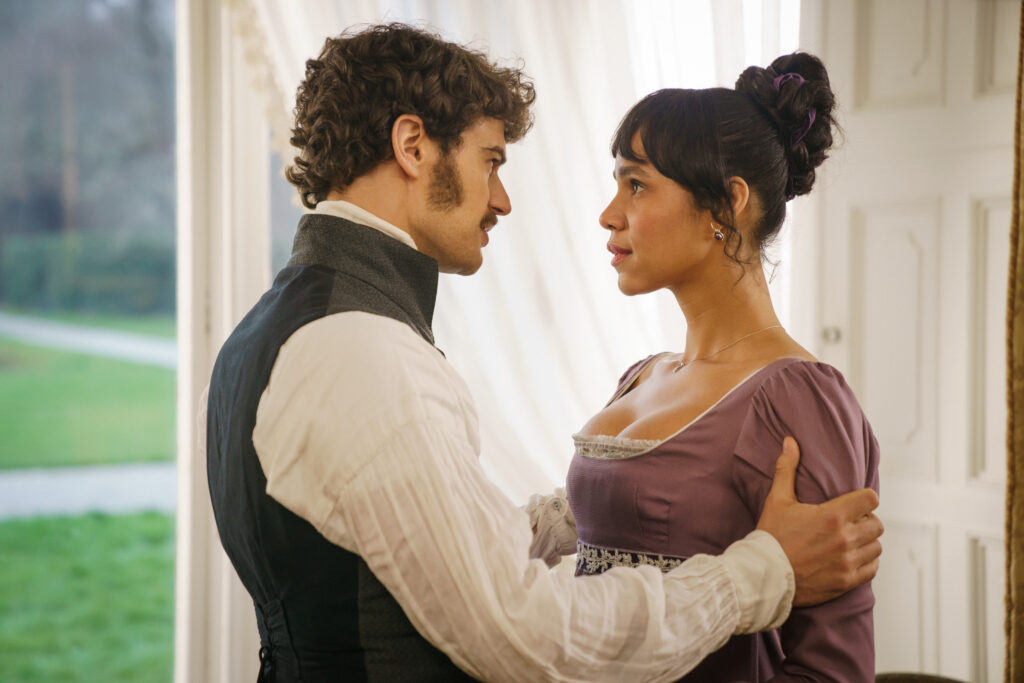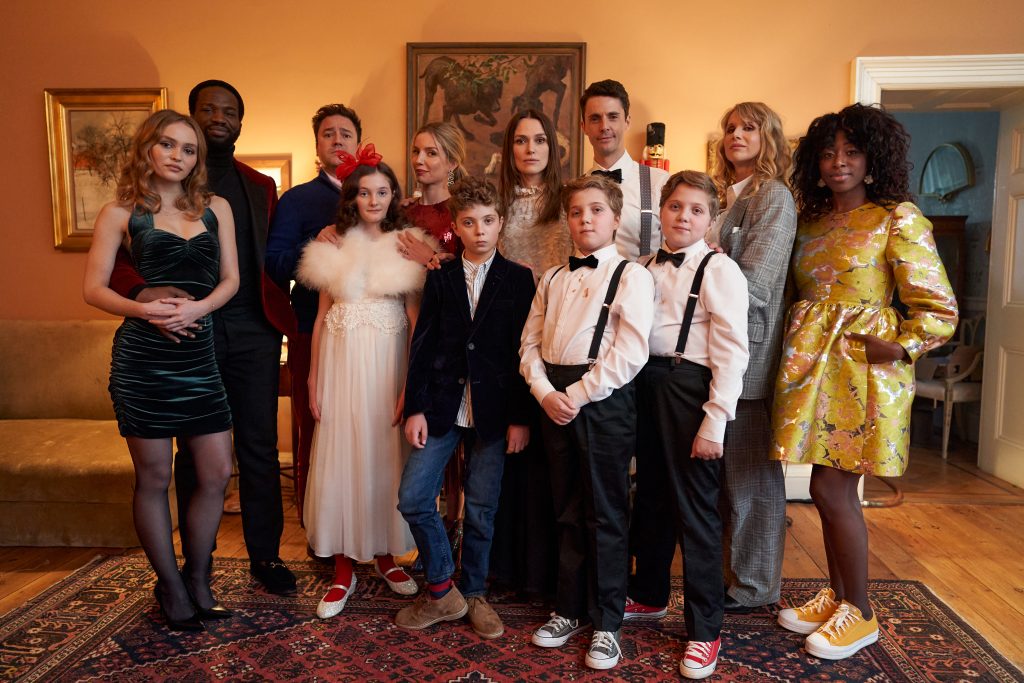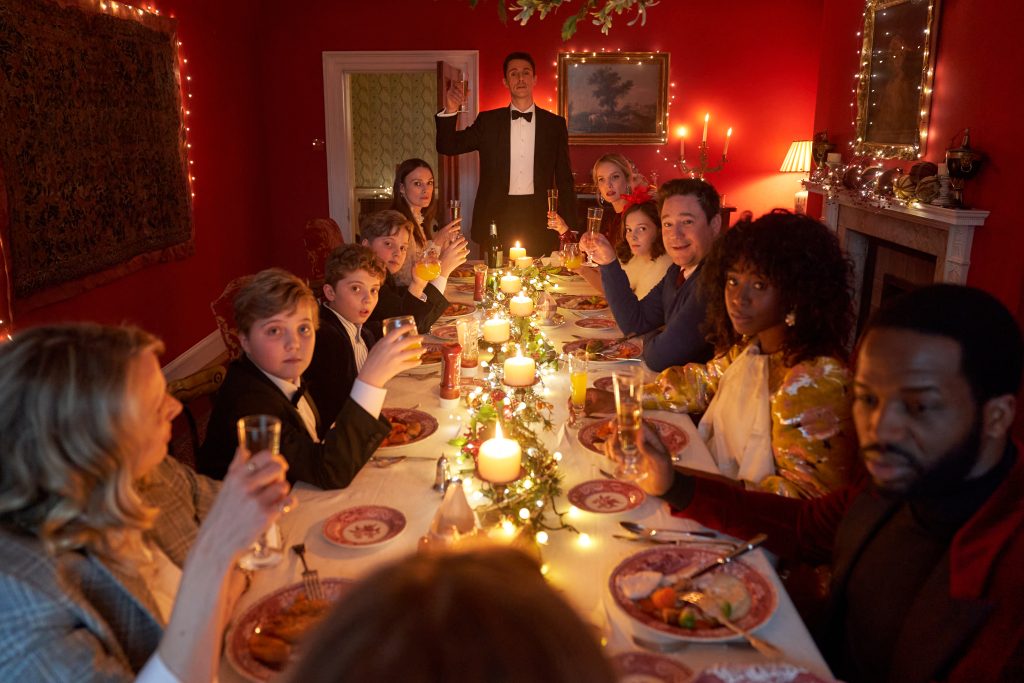July 3, 2022
by Carla Hay

Directed by Emma Holly Jones
Culture Representation: Taking place primarily in 1818 (with a brief flashback to 1802), in England, the comedy/drama film “Mr. Malcolm’s List” features a racially diverse cast of characters (black people, white people and Asians) representing the working-class, middle-class and wealthy.
Culture Clash: London’s most eligible bachelor, who has a list of requirements for his future wife, becomes the target of a romantic scheme concocted by a socialite who was rejected by this wealthy bachelor and who enlists her working-class childhood best friend to seduce the bachelor.
Culture Audience: “Mr. Malcolm’s List” will appeal primarily to people who are fans of Jane Austen-inspired stories about people in 1800s England who are preoccupied with social class and marriage.

Obviously influenced by Jane Austen novels, “Mr. Malcolm’s List” is an entirely predictable comedy/drama romp that’s enjoyable to watch because of the entertaining performances by the movie’s talented cast. The movie hits all the expected beats of a story about class-conscious people in 1800s England who have schemes and misunderstandings when it comes to love and marriage. Most viewers will already know how the movie is going to end, but it’s a delightful ride along the way, filled with costume design, production design and cinematography that are gorgeous.
“Mr. Malcolm’s List” is the feature-film directorial debut of Emma Holly Jones, who also directed the 2019 short film “Mr. Malcolm’s List.” Both movies are based on Suzanne Allain’s 2009 novel of the same name. Allain wrote the screenplay for both movies. Jones is also a producer of the “Mr. Malcolm’s List” movies. These flmmakers clearly have a love of the source material, since the feature film “Mr. Malcolm’s List” does justice to the novel, with the added cinematic choice of making the cast racially diverse.
No one ever mentions people’s racial identities in the movie, but social class is at the forefront of the expectations, perceptions and disagreements that the “Mr. Malcolm’s List” characters have when it comes love and marriage. The movie (which takes place in England) opens in 1802, when two girls, who are about 13 or 14 years old, are roommates at a boarding school called Mrs. Finch’s Ladies Academy.
The scene is very short, but it says a lot about the personalities of these two girls. Julia Thistlewaite (played by Aisling Doyle) is bossy and extroverted. Selina Dalton (played by Tia Ann Jain) is easygoing and introverted. In their bedroom, Julia sees Selina reading a book and says to Selina: “Keeping your head in books all day will not create the marriagable mind.” Selina replies, “I have nothing materially to offer to a husband anyway.” Julia then says, “I have no loving father to offer me a match. A right pair we make.”
It’s later explained in the movie that not only do Julia and Selina have different personalities, but Julia and Selina also come from contrasting backgrounds. Julia is an only child from a wealthy family led by Julia’s widowed mother. Selina is one of several siblings whose married parents are still alive. Selina’s father is a low-income vicar who had a benefactor generously offer to pay for Selina to attend this elite academy.
During this conversation, it’s toward the end of the academic year, so the girls will soon be going their separate ways. Selina and Julia promise that they will always look out for each other. Julia goes a step further and says that after she moves to London and finds a man to marry her, she will find a husband for Selina. Years later, Julia and Selina end up reuniting, but not in the way that Julia thought it would happen during this childhood conversation.
The movie then fast-forwards to 1818. A wealthy heir named Jeremy Malcolm (played by Ṣọpẹ Dìrísù) is widely known as London’s most eligible bachelor. It’s explained that he inherited a vast estate from an aunt. And even though Mr. Malcolm is the younger son of an earl (who is now deceased), Mr. Malcolm has no royal title of his own. Even without a title, his wealth, charisma and good looks have made women eager to get his attention.
Julia (played by Zawe Ashton) is one of these women. And she’s managed to get a date with Mr. Malcolm, who takes Julia to see an opera performance. They have balcony seating all to themselves. Mr. Malcolm and Julia have very little chemistry together on the date. Julia tries too hard to impress him. She doesn’t have the intelligence that he wants in a woman, so it’s a turnoff for Mr. Malcolm.
A dealbreaker for him is how Julia reacts when he asks her what she thinks about the Corn Laws, which at that time were England’s tariffs and other trade restrictions on imported corn and other imported food. Julia’s response shows she has no idea what he’s talking about: “I believe that restraint in one’s diet is bound to have a healthy effect” she says with a forced smile. Needless to say, Julia doesn’t get another date with Mr. Malcolm.
Throughout the movie, there are two gossipy women named Lady Margaret (played by Danielle Ryan) and Lucy (played by Emma Lou Willis, also known as Emma Willis), who lurk around because they’re nosy about Mr. Malcolm’s love life. They’re first seen observing Mr. Malcolm and Julia on their opera date, because these two gossips are seated in a nearby balcony. Lady Margaret and Lucy make catty comments out loud to each other about the women whom Mr. Malcolm takes on dates. It’s comic relief that’s intermittent and fortunately not too much of a distraction.
Two other characters who are mostly in the background but make occasional comedic comments are a maid named Molly (played by played by Sianad Gregory) and a footman named John (played by Divian Ladwa), who are characters that are not in the “Mr. Malcolm’s List” book. John and Molly are dutiful to their wealthy employers. But when these employers aren’t looking, Molly and John show some exasperation at how these employers tend to live in a privileged “bubble” and are out of touch with the rest of society. For example, when Mr. Malcolm and his social circle have a pretentious discussion about how to fix social problems of the working-class, John snidely says to himself, “They could pay us more.”
Meanwhile, Selina (played by Freida Pinto) has been living in Sussex and has recently lost her job as a caretaker for an elderly woman because the woman has died. And just as Selina was in her adolescence, Selina is not as preoccupied as Julia is with finding a husband. Selina is seen politely rejecting the marriage proposal of an affluent man named Mr. Woodbury (played by Gerry O’Brien), who’s old enough to be her father.
Mr. Woodbury barely knows Selina, but he knows that she doesn’t have much money, and he can offer her a financially comfortable life. He’s stung by Selina’s rejection. Mr. Woodbury warns Selina about her refusal to marry him: “If you refuse, your prospects will be grim indeed.” Selina firmly stands by her decision. In other words, it’s the movie’s way of showing that Selina only wants to marry for love, not for money.
Someone else who’s not taking rejection very well is Julia. When she finds out that Mr. Malcolm doesn’t want to court her anymore, she’s determined to find out why. Julia’s agitation goes into overdrive when she sees a satiric illustration of Mr. Malcolm on a date with her, and the illustration has this caption: “Next!” Adding to Julia’s humiliation, this caricature has been published and distributed, so many people in London’s society have seen it.
Julia’s sarcastic cousin Lord Cassidy (played by Oliver Jackson-Cohen), who is a friend of Mr. Malcolm’s, tells Julia about a secretive list that Mr. Malcolm has compiled. This list has all the requirements that Mr. Malcolm wants in a wife because he doesn’t want to marry a gold digger or anyone who is shallow, selfish and less-than-smart. And apparently, Julia didn’t meet the requirement of the ability to converse in a sensible fashion.
A furious and offended Julia then comes up with a revenge plan to get Mr. Malcolm to fall in love with another woman, who will then reject Mr. Malcolm by surprising Mr. Malcolm with a list of requirements that Mr. Malcolm does not meet. Julia decides that her former schoolmate Selina, whom she hasn’t seen in years, would be the ideal person to recruit to be the seductress. Even though Selina is a kind, intelligent and physically attractive woman, snobby Julia thinks that Selina being “poor” makes it unlikely that Selina could marry someone of Mr. Malcolm’s status.
Julia makes a trip to Sussex to reunite with Selina and tell her about this plan. Julia makes it sound like Mr. Malcolm is a jerk who deserves to have this revenge. Selina is very reluctant to participate in this scheme, but she agrees out of loyalty to Julia and out of curiosity to go to London to meet Mr. Malcolm. To Selina’s surprise, Selina finds Mr. Malcolm to be pleasantly charming and attractive. And the feeling is mutual.
You know where this is going, of course. The more time that Mr. Malcolm and Selina spend together, the more he finds out that Selina checks all the requirements on his list. He has no idea that Selina was recruited by Julia to seduce him. Selina finds out that she doesn’t need to pretend to be interested in Mr. Malcolm, and she becomes less inclined to betray Mr. Malcolm. Meanwhile, Julia pressures a reluctant Lord Cassidy to continue to give Julia important information about Mr. Malcolm, so that Julia’s revenge plot can go exactly as she plans.
During the courtship of Mr. Malcolm and Selina, another confident and eligible bachelor arrives on the scene: Captain Henry Ossory (played by Theo James), the nephew of the deceased elderly woman who was Selina’s most recent employer. Captain Ossory meets Selina and Mr. Malcolm for the first time during a social get-together. Captain Ossory is effusive in his compliments to Selina, because he had heard good things about her from his aunt.
Captain Ossory finds Selina attractive too, and he asks her out on a date in front of Mr. Malcolm. Selina says yes. And now, Mr. Malcolm thinks he’s got some competition for Selina’s affections. More courting and scheming go on during lavish ballroom parties, banquets and romantic dates.
In addition, some family members have an effect on all these social encounters. Julia’s domineering and meddling mother Mrs. Thistlewaite (played by Naoko Mori) is desperate for Julia to marry a man who’s wealthier than the Thistlewaite family. Selina’s loving and laid-back parents (played by Paul Tylak and Dawn Bradfield) eventually meet Mr. Malcolm’s widowed mother Lady Kilbourne (played by Doña Croll), who is astute and perceptive about the people who come into her son’s life. These parents don’t have first names in the movie, by the way.
And in the last third of the movie, a ditsy and tactless woman named Gertie Covington (played by Ashley Park) arrives on the scene to give unwitting insults and cause a little bit of social chaos. Who Gertie is and how she knows certain people in the story aren’t handled very well, but the reveal of her identity further fuels some of the melodrama that happens around Julia’s vendetta. Gertie’s role in the story speaks to how people deal with the concept of how a potential spouse’s family members can affect a relationship or potential marriage.
“Mr. Malcolm’s List” delivers everything audiences can expect from lush period movies that take place in high society England in the 1800s. It’s the cinematic version of a romance novel that plays into fantasies of people living in a world where their biggest problems are about finding the ideal spouse or life partner. Even the “poor” people in “Mr. Malcolm’s List” look well put-together. Amelia Warner’s romantic musical score is perfectly suited for the movie.
All of the cast members give skilled performances that deliver the witty banter and emotional entanglements with believable charm. A character such as Julia could have been extremely irritating for the entire movie (and she does have plenty of annoying moments), but Ashton’s performance gives the Julia character a lot of realistic and occasionally amusing humanity. All of the other cast members portray their characters exactly how people expect them to act.
“Mr. Malcolm’s List” has some over-used romantic movie clichés, including a scene showing a race against time to confess true love. But those stereotypes can easily be forgiven when “Mr. Malcolm’s List” does such a good job of keeping people’s interest in these characters and how they handle their romance predicaments. “Mr. Malcolm’s List” takes place in the 1800s, but the movie shows in clever ways that the enormous pressures that many people put on themselves to find a spouse or life partner aren’t exclusive to a bygone era and still happen today.
Bleecker Street released “Mr. Malcolm’s List” in U.S. cinemas on July 1, 2022. The movie is set for release on digital and VOD on July 21, 2022.






